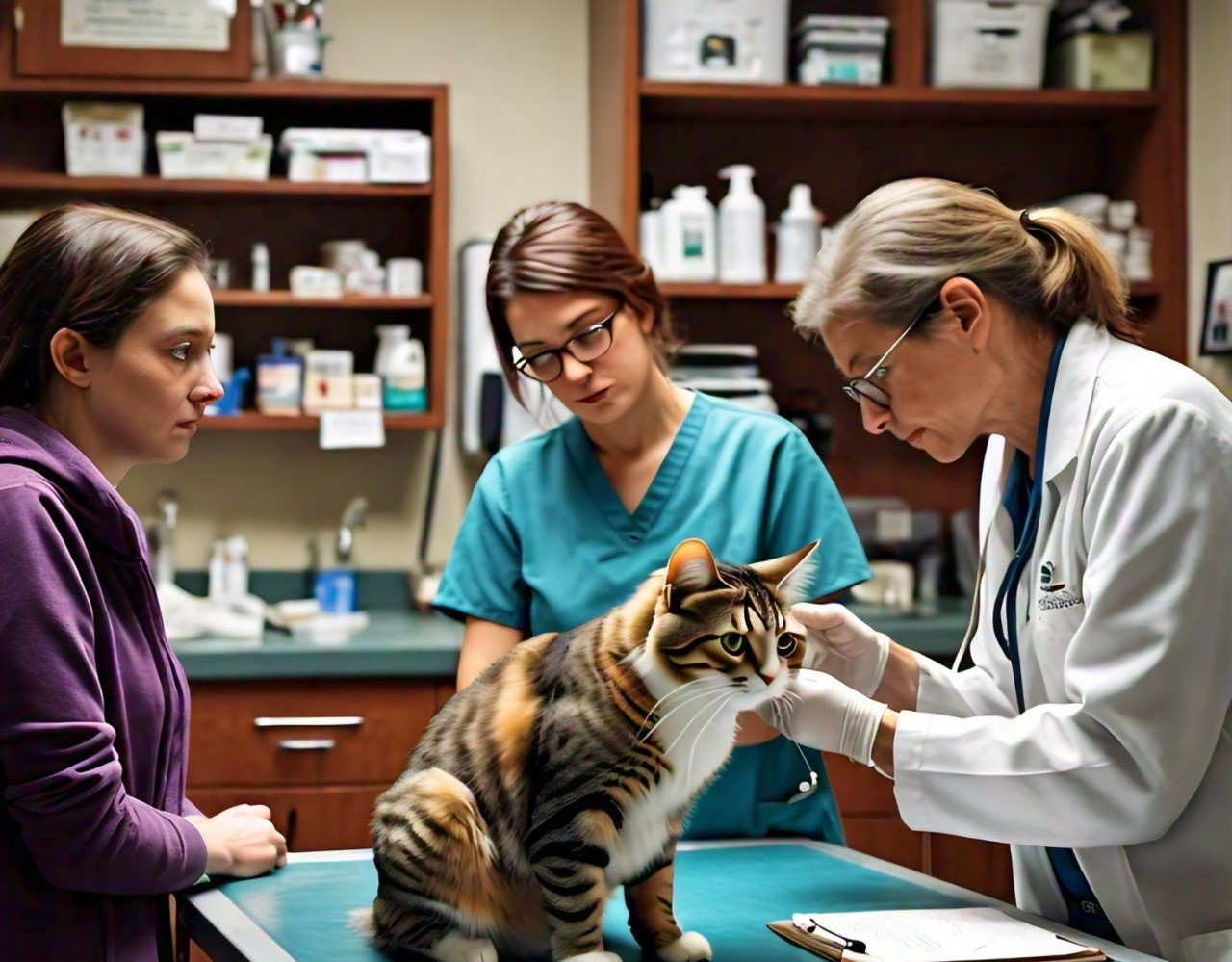As a responsible cat owner, ensuring the well-being of your feline friend is of utmost importance. One of the key aspects of cat care that should never be overlooked is regular veterinary visits. Understanding the significance of these visits can greatly enhance the quality of life for your cat, prevent potential health issues, and strengthen the bond between you and your pet. In this comprehensive article, we will delve into the importance of regular vet visits:cat owner should know the benefits they offer, and what cat owners should know to keep their furry companions healthy and happy.
Why Regular Vet Visits Matter
We will delve into the importance of regular vet visits:cat owner should know.
1. Early Detection of Health Issues
Regular vet visits play a crucial role in the early detection of health issues. Cats are notorious for hiding their pain and discomfort, making it challenging for owners to recognize when something is wrong. During routine check-ups, veterinarians can perform thorough examinations, conduct necessary tests, and identify any potential health problems before they escalate. Early detection allows for timely intervention, increasing the chances of successful treatment and preventing minor issues from becoming major concerns.
2. Preventive Care
Preventive care is a cornerstone of maintaining your cat’s health. During regular vet visits, your veterinarian will administer vaccinations, perform parasite control, and offer guidance on nutrition and lifestyle choices. Vaccinations protect your cat from various infectious diseases, while parasite control prevents infestations of fleas, ticks, and worms. By staying up-to-date with preventive measures, you can significantly reduce the risk of your cat contracting illnesses and ensure they lead a healthier life.
3. Monitoring Weight and Nutrition
Maintaining a healthy weight is vital for your cat’s overall well-being. Obesity can lead to a range of health issues, including diabetes, arthritis, and heart disease. Regular vet visits allow your veterinarian to monitor your cat’s weight and provide tailored dietary recommendations. They can also offer insights into portion control, the best types of food for your cat’s age and breed, and tips on encouraging physical activity. Proper nutrition and weight management contribute to a longer, happier life for your feline friend.
4. Dental Health
Dental health is often overlooked but is essential for your cat’s overall health. It can cause pain, difficulty eating, and even lead to systemic infections. During vet visits, your veterinarian will examine your cat’s teeth and gums, perform professional cleanings if necessary, and advise you on at-home dental care. Regular dental check-ups can prevent periodontal disease and other dental problems, ensuring your cat maintains healthy teeth and gums.
5. Behavioral Assessment
Behavioral changes in cats can be indicators of underlying health issues. Regular vet visits provide an opportunity for veterinarians to assess your cat’s behavior and identify any signs of stress, anxiety, or illness. If your cat exhibits unusual behaviors, such as aggression, excessive grooming, or changes in litter box habits, your vet can help determine the cause and recommend appropriate solutions. Addressing behavioral issues promptly can improve your cat’s quality of life and prevent further complications.
What to Expect During a Regular Vet Visit
1. Physical Examination
A comprehensive physical examination is a fundamental part of a regular vet visit. Your veterinarian will assess your cat’s overall condition, including their coat, skin, eyes, ears, nose, and mouth. They will check for any abnormalities, lumps, or signs of infection. The vet will also listen to your cat’s heart and lungs, palpate their abdomen, and evaluate their joint health. This thorough examination helps identify any potential health concerns and ensures your cat is in good physical condition.
2. Vaccinations and Preventive Treatments
During the visit, your veterinarian will review your cat’s vaccination history and administer any necessary booster shots. Vaccinations are essential for protecting your cat from diseases such as feline leukemia, rabies, and feline distemper. Additionally, your vet will recommend preventive treatments for parasites, including flea and tick control and deworming. These treatments are crucial for preventing infestations and keeping your cat parasite-free.
3. Diagnostic Tests
Depending on your cat’s age, breed, and health status, your veterinarian may recommend various diagnostic tests. These tests can include blood work, urinalysis, fecal examination, and imaging studies such as X-rays or ultrasounds. Diagnostic tests provide valuable insights into your cat’s internal health and help detect underlying conditions that may not be apparent during a physical examination. Early diagnosis through these tests can lead to more effective treatment and better outcomes.
4. Dental Check-Up
As mentioned earlier, dental health is a vital aspect of your cat’s overall well-being. During the vet visit, your veterinarian will examine your cat’s teeth and gums for signs of dental disease. If necessary, they may perform a professional dental cleaning to remove plaque and tartar buildup. Regular dental check-ups and cleanings can prevent painful dental issues and contribute to your cat’s long-term health.
5. Nutrition and Weight Management
Your veterinarian will discuss your cat’s diet and provide recommendations based on their age, breed, and health status. They may suggest specific types of cat food, portion sizes, and feeding schedules to ensure your cat receives proper nutrition. If your cat is overweight or underweight, the vet will develop a personalized weight management plan to help achieve a healthy weight. Proper nutrition and weight management are essential for preventing obesity-related health problems and promoting overall vitality.
Tips for Making Vet Visits Less Stressful
1. Acclimate Your Cat to the Carrier
Many cats associate their carrier with stressful trips to the vet. To reduce anxiety, make the carrier a positive and familiar space for your cat. Leave it open in a comfortable area of your home and place treats, toys, and bedding inside. Encourage your cat to explore and spend time in the carrier voluntarily. When it comes time for a vet visit, your cat will be more comfortable and less stressed during the journey.
2. Use Calming Aids
Consider using calming aids to help reduce your cat’s anxiety during vet visits. Products such as pheromone sprays, calming collars, and natural supplements can have a soothing effect on your cat. Consult your veterinarian for recommendations on safe and effective calming aids that are suitable for your cat’s specific needs.
3. Schedule Appointments Strategically
Try to schedule vet appointments at times when the clinic is less busy. This can help minimize wait times and reduce your cat’s exposure to other animals, which can be stressful. Additionally, inform the clinic in advance if your cat has specific anxieties or requires extra care, so they can accommodate your cat’s needs and ensure a smoother experience.
4. Remain Calm and Positive
Cats are highly perceptive and can pick up on their owner’s emotions. Stay calm and positive during vet visits to reassure your cat. Speak in a soothing tone and offer gentle petting and praise. Bringing along a familiar blanket or toy can also provide comfort and a sense of security for your cat.
5. Practice Mock Vet Visits
To desensitize your cat to the vet visit experience, practice mock vet visits at home. Gently handle your cat’s paws, ears, and mouth to simulate a physical examination. Reward your cat with treats and praise for staying calm. Gradually increase the duration and intensity of these mock visits to help your cat become more accustomed to being handled.
Common Health Issues Detected During Vet Visits
1. Dental Disease
Dental disease is a prevalent issue among cats and can lead to severe pain and discomfort. During regular vet visits, veterinarians can detect early signs of dental disease, such as gum inflammation, tartar buildup, and tooth decay. Prompt treatment and preventive dental care can prevent the progression of dental disease and ensure your cat maintains healthy teeth and gums.
2. Obesity
Obesity is a common health problem in cats that can lead to various complications, including diabetes, arthritis, and heart disease. Regular vet visits allow veterinarians to monitor your cat’s weight and provide guidance on proper nutrition and exercise. By addressing obesity early on, you can help your cat achieve and maintain a healthy weight, reducing the risk of obesity-related health issues.
3. Parasite Infestations
Parasite infestations, such as fleas, ticks, and worms, can cause significant discomfort and health problems for your cat. During routine check-ups, veterinarians can identify and treat parasite infestations before they become severe. Preventive treatments, such as flea and tick control and regular deworming, are essential for keeping your cat parasite-free and ensuring their overall well-being.
4. Urinary Tract Issues
Urinary tract issues, including urinary tract infections (UTIs) and urinary stones, are common in cats and can cause pain and difficulty urinating. Regular vet visits allow veterinarians to detect early signs of urinary tract problems through urinalysis and physical examination. Timely diagnosis and treatment can prevent complications and ensure your cat’s urinary health.
5. Kidney Disease
Kidney disease is a prevalent condition in older cats and can lead to serious health complications if left untreated. During regular vet visits, veterinarians can perform blood work and other diagnostic tests to assess your cat’s kidney function. Early detection and management of kidney disease can significantly improve your cat’s quality of life and slow the progression of the disease.
Conclusion
In conclusion, regular vet visits are essential for maintaining your cat’s health and well-being. The importance of regular vet visits: cat owner should know, cannot be overstated. These visits enable early detection of health issues, provide preventive care, and ensure proper nutrition and weight management. Regular veterinary check-ups also play a crucial role in monitoring dental health, addressing behavioral concerns, and detecting common health problems such as obesity, dental disease, parasite infestations, urinary tract issues, and kidney disease.
As a cat owner, it is your responsibility to prioritize your feline friend’s health by scheduling regular vet visits and following your veterinarian‘s recommendations. By doing so, you can ensure that your cat leads a long, healthy, and happy life. Remember, the importance of regular vet visits: cat owner should know, cannot be overstated. Your proactive approach to your cat’s healthcare will contribute to their overall well-being and strengthen the



